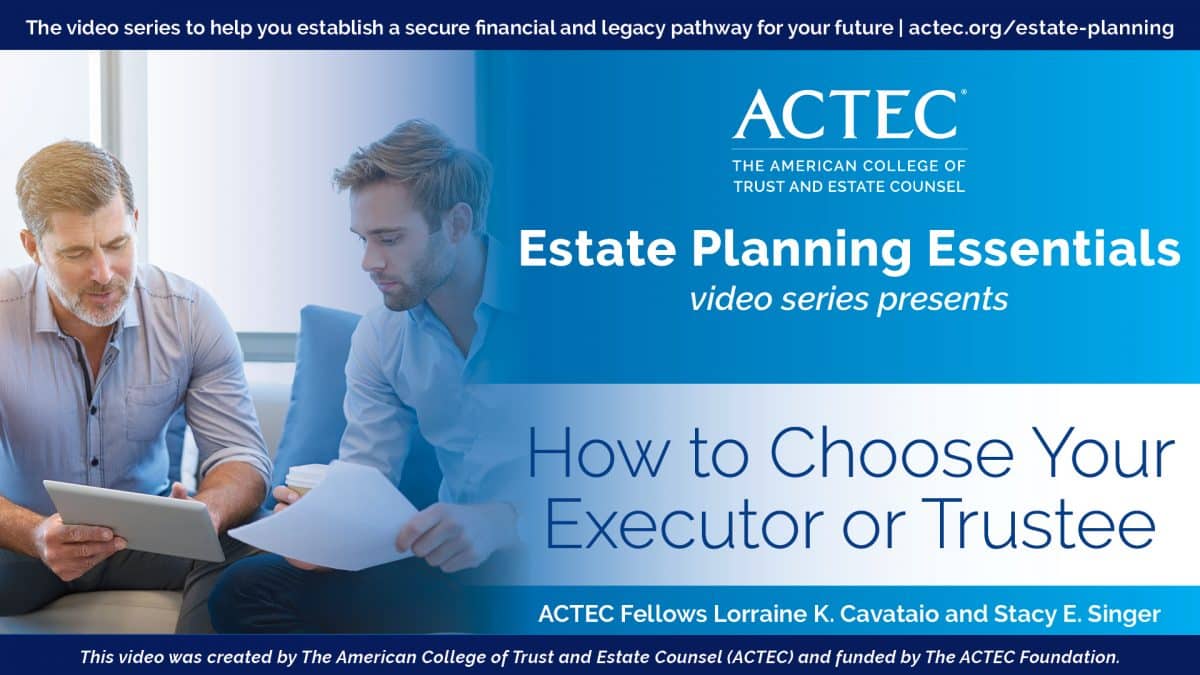Setting up trusts for children is important because it allows you to provide for their financial future while maintaining control over the distribution of assets, ensuring they are used for their benefit. It also helps protect the assets from potential creditors and legal complications, ultimately safeguarding your children’s financial security.
ACTEC Fellows Tami Conetta and Natalie M. Perry discuss the best way to leave assets to minor children, whether children should receive equal assets, explain a Pot Trust, considerations if your child is married, and more.
Transcript
Hi, I’m Natalie Perry an ACTEC Fellow from Chicago and I’m here today with Tami Conetta an ACTEC Fellow from Sarasota, Florida. Today we’re going to talk about leaving assets to children in Trust. Tammy, I have a few questions that I was hoping you could answer for me on how best to address shares for your children and how the children should actually receive the money.
One of the big questions I think people have is should I leave everything equally to my children? Can you touch on that?
Tami Conetta: Sure. And I think that is the most difficult question for any parent to answer because you love all your children equally but you do recognize that they have different needs and so the default is always yes, that’s where you start with — leave them equal shares. But then, I always encourage clients to think about the circumstances of each of their children. Some of them may be wildly successful in business, others may be wildly successful as teachers but not as financially secure as the one who’s done well in business, and so being able to balance that out sometimes is a really good objective. But the important thing is that you communicate with your children and explain to them why, if you’ve done something not perfectly equally, so that they understand and hopefully can buy into that process as well.
Natalie Perry: Okay, that’s helpful. Thanks. What if I have children that are different ages? Perhaps there was a second marriage or some children have already gone through college, they’ve been educated and then I’ve got some younger children that I know have more expenses ahead of them?
Tami Conetta: Yes. So we often see that, and one of the things that we recommend is that they consider using what we call a Pot Trust because you put all the money into one pot and hold it until perhaps the youngest one reaches a certain milestone. For example, it could be graduating from high school or college, and then at that point you can split it up into shares for the children, whether it’s equal or unequal. But what you’re trying to do is replicate what the parent would actually be doing for the children. So you know, as a parent I’m going to keep all my money in one share and dole it out as I think it’s appropriate, but then when they reach a certain age it can be divided and then they have some control over their own share.
Natalie Perry: Okay. When you said dole it out as I think it’s appropriate, so if I’m alive I can decide you know what to give my children and when, but if I’m not around, how do I know when the right time is for children to actually receive assets or can you talk about that a bit?
Tami Conetta: Sure. Well, and it’s different for every child. You know, it’s some children mature earlier some children mature later. A lot of times the reason that we hold assets in Trust for our children is to give them an opportunity to gain some skills that maybe they don’t have at the time that the Trust is initially created. Whether it’s just maturity that’s necessary because they’re younger or maybe you want them to learn how to manage money better and how to do the investments before the money is actually turned over to them, and so they can sit alongside the trustee and learn those skills along the way.
Natalie Perry: Okay. What if I don’t like my son or daughter-in-law? For people who have adult children that are married and maybe even have some kids, if the client has some concerns about the marital situation, what do you do differently?
Tami Conetta: Yeah. It may even be that the marriage is fine right now but we know that more than half of all marriages don’t make it, and so it’s really important to take that into consideration in the planning process, and for a lot of our clients that’s the driver behind putting money into Trust because they feel like as long as the money is held in Trust it’s protected. And under most state laws there is a level of protection. It may not be absolute, but it definitely can hold those assets in a way that could protect them in the event that there could be a divorce later. The corollary to that of course is, what if you do love your in-law and you want to make sure that if your child dies that they’re taken care of, and they should definitely be included in the Trust document because most often they’re not and it’s not something that is often seen but on occasion you know you have a really good relationship with your in-laws.
Natalie Perry: Okay. What if my son or daughter might want to buy a house or start a business? Does that get specifically spelled out in the Trust or how does that get addressed?
Tami Conetta: Well, it definitely should. The whole point of a Trust document is to communicate to the trustee what your wishes are and what you want to happen in case you’re not there to be able to do it yourself. And so if you would ordinarily help pay for a wedding or give them seed money to start a business or down payment for a house, then you should definitely include that in the document because then the trustee knows and it makes that decision much easier for the trustee. If it’s not clearly spelled out, they may have to go through a lot of hoops to try and get to the same place. Hopefully, they can still get to the same place. Just make sure that the Trust isn’t too narrow in its discretionary language.
Natalie Perry: Okay, great. Well, you’ve given us a lot to think about. I appreciate your time today. Thanks for being here and for educating us on leaving money to children in Trust.
Tami Conetta: You’re welcome.
Featured Video
How to Choose Your Executor or Trustee
Learn how to select the right executor or trustee for your estate, their responsibilities, and other considerations of note for a smooth estate transition.
ACTEC Estate Planning Essentials

ACTEC Fellows provide answers to frequently asked trust and estate planning questions in this video series.



